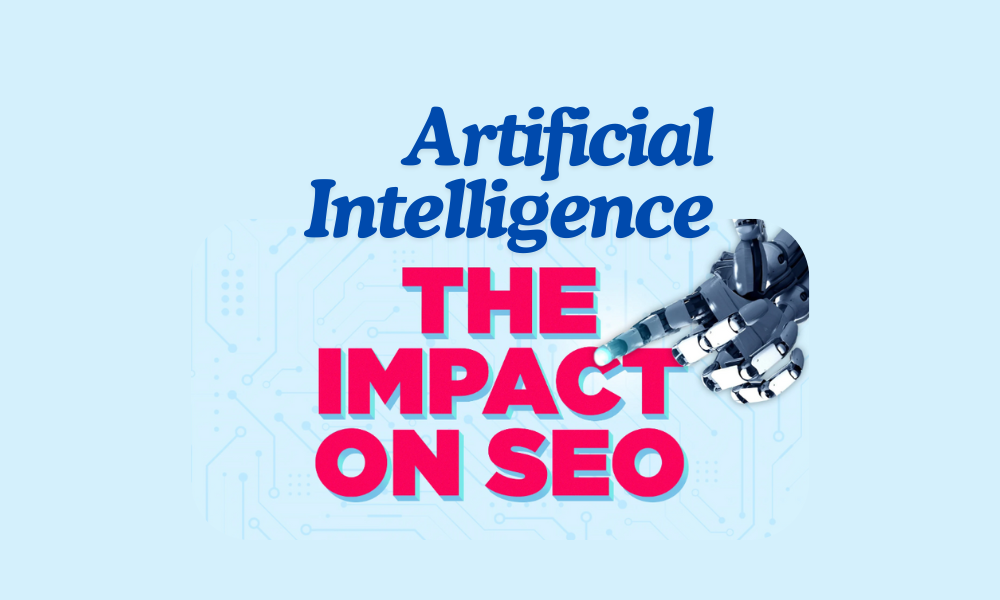Artificial Intelligence (AI) is revolutionizing various industries, and one significant area of impact is Search Engine Optimization (SEO). In this article, we’ll delve into how AI is reshaping SEO strategies, making them more dynamic and effective.

Table of contents
Understanding AI in SEO
AI-powered machine learning algorithms analyze vast amounts of data to understand user behavior, preferences, and search patterns. This information is then utilized to optimize content and improve website rankings.

NLP enables search engines to comprehend and interpret human language more accurately. This development has led to better understanding of user queries, allowing for more relevant search results.
Impact of AI on Search Engine Rankings
Personalized Search Results:
AI algorithms are transforming search engines by personalizing search results for users. These algorithms analyze a user’s search history, location, device, and preferences to deliver tailored search results. For example, if a user frequently searches for tech news, their search results may prioritize technology-related content.
Voice Search Optimization:
The rise of voice search, powered by AI technologies like natural language understanding (NLU) and voice recognition, is reshaping SEO strategies. Voice search optimization involves optimizing content to match the way people speak when using voice-enabled devices like smartphones, smart speakers, and virtual assistants

Contextual Understanding and Semantic Search:
AI-powered algorithms enable search engines to understand the context and meaning behind search queries through semantic search. Semantic search goes beyond matching keywords to content; it interprets the intent behind the query and considers the context of words to deliver more relevant results.
Predictive Analytics for Ranking Trends:
AI-driven predictive analytics play a crucial role in identifying and adapting to emerging ranking trends. These analytics leverage machine learning algorithms to analyze vast amounts of data, including user behavior, industry trends, and competitor strategies.
AI Tools for SEO
AI-powered tools offer a range of capabilities to streamline SEO efforts:

· Content Generation
AI can generate high-quality content based on specified parameters, saving time and effort for content creators. However, it lacks the quality and emotional touch that humans include.
· Keyword Research and Analysis
AI tools analyze keywords, search trends, and competition to recommend effective keyword strategies for SEO campaigns.
· Rank Tracking and Monitoring
AI algorithms track website rankings, identify performance trends, and provide insights for optimizing SEO accordingly.
Challenges and Solutions
Challenges:
- Data Privacy Concerns: Ensuring that AI algorithms handle user data ethically and securely.
- Algorithm Biases: Addressing biases in AI models that may affect search results unfairly.
- Complexity in Implementation: Integrating AI tools into existing SEO strategies can be challenging.
- Skill Gap: Acquiring the necessary skills and knowledge to leverage AI effectively in SEO.
- Cost of Implementation: AI tools and technologies can be costly to implement and maintain.
Solutions:
- Robust Privacy Policies: Implementing strict data privacy policies and compliance measures.
- Bias Detection and Correction: Using AI tools to detect and correct biases in algorithms.
- Seamless Integration: Partnering with AI experts or using user-friendly AI platforms for easier integration.
- Training and Upskilling: Providing training programs to bridge the skill gap and empower teams.
- Cost-Effective Solutions: Exploring cost-effective AI solutions and optimizing resource allocation.
Future Trends in AI and SEO
The future of AI in SEO is exciting, with advancements expected in:
- Predictive Analytics for SEO
- Enhanced User Experience through AI-driven personalization
- Automated SEO Audits and Recommendations
Conclusion
The integration of Artificial Intelligence (AI) into Search Engine Optimization (SEO) is a game-changer for digital marketers as well as for the businesses worldwide. AI-powered tools and algorithms have revolutionized how we approach SEO, offering unparalleled insights, efficiencies, and opportunities for growth.
Read more :
Your Ultimate Guide to Content Writing in 2024
FAQs about AI Impact on SEO
AI enhances keyword research by analyzing search trends as well as competition, and user intent more effectively. Secondly, it can identify long-tail keywords, assess keyword difficulty, and recommend strategic keyword strategies for improved SEO performance.
Ethical considerations include data privacy, transparency in AI algorithms, avoiding bias in decision-making, and ensuring compliance with regulations such as GDPR. It’s important to use AI responsibly and ethically in SEO practices.
AI-generated content has made significant advancements in quality and coherence. While it can produce high-quality content, human-written content often maintains a unique voice, creativity, and emotional connection that AI may struggle to replicate fully.
AI plays a crucial role in voice search optimization by improving natural language understanding as well as voice recognition accuracy, and providing relevant search results based on spoken queries. Moreover, optimizing content for voice search is essential in today’s digital landscape.
The future trends of AI in SEO include predictive analytics for SEO strategies, further advancements in personalized user experiences, automated SEO audits and recommendations, and the continued evolution of AI-powered tools for enhanced SEO performance.




